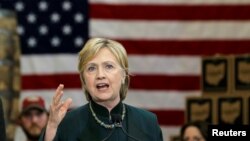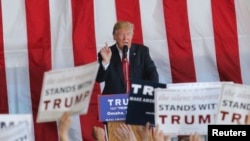Presumptive Republican presidential nominee Donald Trump and Democratic front-runner Hillary Clinton have spoken out against the Trans-Pacific Partnership (TTP) in a year when almost no one has defended free-trade pacts on the campaign trail.
Signed earlier this year, TPP aims to lower tariffs and boost trade among 12 Pacific Rim nations. The pact has yet to go into effect and is getting no love on the U.S. presidential campaign trail.
“We’re going to get rid of TPP,” Trump told supporters Sunday in Spokane, Washington. “We’ve got to stop it. NAFTA (North American Free Trade Agreement) was a disaster. This (TPP) is going to be worse.”
Last week, Clinton reiterated her opposition to TPP, mirroring that of Democratic challenger Bernie Sanders.
Urges no action
Responding to a questionnaire by labor, environmental and human rights groups, Clinton wrote that Congress should not take up the agreement before or after the November election.
She first staked out her position shortly after the pact was announced late last year.
“I am not in favor of what I have learned about it,” Clinton said. “I am worried about currency manipulation not being part of the agreement. We have lost American jobs to the manipulations that countries, particularly in Asia, have engaged in.”
As secretary of state during President Barack Obama’s first term, Clinton praised TPP as “the gold standard in trade agreements.”
Her misgivings about the pact as a presidential candidate point to an overall souring of trade as an issue in America’s current election cycle.
Confusion, contradictory positions
Of the three Republican finalists – Trump, Ted Cruz and John Kasich – only Kasich consistently spoke in favor of free-trade deals in general and TPP in particular.
"I’ve always been a fair trader and a free trader at the same time,” the Ohio governor said in March. “Thirty-eight million Americans have jobs that are connected to trade. So we do want to have free trade."
Even before suspending his campaign last week, Kasich’s voice was often drowned out by that of Trump.
“When you look at the horrible trade deals where we are losing a fortune to every country we do business with, our jobs are being sucked away,” the New York businessman said. “It is unbelievable what is happening.”
At times the discourse can seem confusing. For instance, Trump rails against tariffs placed on U.S. exports, the same tariffs TPP would eliminate.
“When you send your beautiful agriculture, best in the world, when you send your agricultural products in, what happens?” Trump asked supporters in farm-rich Nebraska last week. “Thirty-eight percent tax, right? Thirty-eight percent tax to Japan. Think of it.”
Amid all the anti-TPP rhetoric, the White House is standing firm.
“From an economic, strategic and values perspective, we have a very strong argument to make about the wisdom of Congress moving to approve the TPP agreement that the president negotiated,” White House spokesman Josh Earnest said last week.
The Republican-led Congress has granted “fast-track” authority to facilitate the approval of trade pacts, but neither chamber is giving any indication it plans to vote on TPP in the immediate future.







